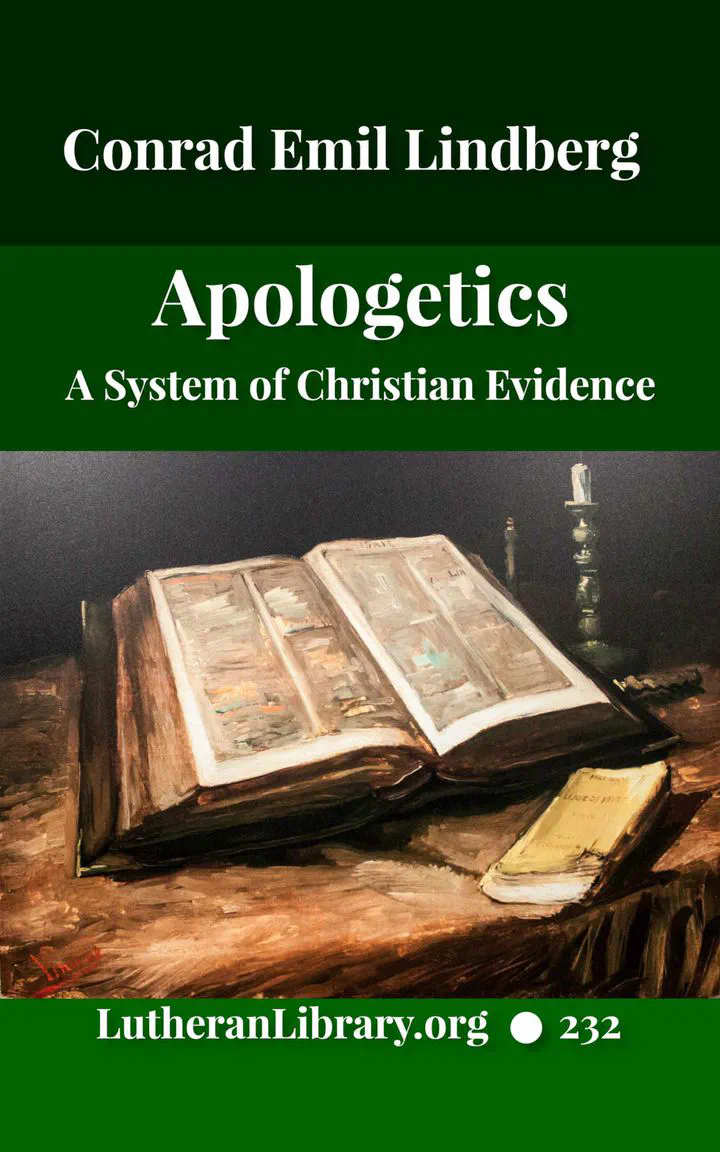Apologetics by Conrad Emil Lindberg

“Without the Holy Scriptures nothing certain would be known concerning the future destiny of man and the world. No book gives us such assurance as the Bible does. In the light of the Bible the riddle of the universe is solved. Only the Bible can console the human heart and show the way to salvation.
“Experience proves that the Bible is the only book which is God’s own book, revealing to us the Son of God in Christ Jesus. Except He had come from the world beyond and told us things which otherwise would have been unknown, our knowledge had become limited and our salvation impossible. If we only knew and were sure in regard to these things, some answer; but one thing is certain, that if the Bible does not make us certain, no other book will, and the reading of the words of Jesus is overpowering.” — Conrad Lindberg
Level of Difficulty: Intermediate: Some subject matter knowledge helpful.
Book Contents
- Preface
- Introduction to Apologetics.
- §1. Definition Of Apologetics.
- §2. History Of Apologetics.
- 1 The Ancient Period.
- 2 The Catholic Scholastic Period.
- 3 The Protestant Scholastic Period.
- 4 The Modern Period.
- §3. Causes Of Infidelity.
- 1 Historical Causes.
- 2 Ecclesiastical Causes.
- 3 The False Modern Science.
- 4 Ethical Causes.
- 5 Social Causes.
- §4. Divisions Of Apologetics.
- I. Theological Apologetics.
- §5. Antecedent Fundamental Facts.
- 1 Theism.
- 2 Philosophical Facts as Fundamental.
- 3 Apocalyptical Facts.
- §6. The Canonical Books Of The Bible As Fundamental.
- 1 The Genuineness and Credibility of the Books Generally Considered.
- 2 General Remarks on the Inspiration of the Scriptures.
- §7. The Bible And Modern Criticism.
- 1 The Modern Criticism and Inspiration.
- 2 Modern Criticism in Relation to the Historicity of the Books and Related Questions.
- §8. Immanence Of God.
- 1 Deism.
- 2 Agnosticism.
- §9. Miraculous Facts.
- 1 Objections to Miracles.
- 2 Arguments for the Truth of Miracles.
- II. Anthropological Apologetics.
- §10. The Creation Of Man.
- 1 The Claim of the Bible and Christianity.
- 2 Various Arguments against the Pseudo-evolution Theory.
- 3 Unity of the Human Race.
- §11. Man’s Nature.
- §12. Moral Evil.
- 1 The Account of the Fall of Man in Genesis is Historically True.
- 2 The Cause of the Moral Evil.
- 3 The Fact of Human Sin.
- §13. Physical Evil.
- 1 Attempts to Explain the Reasons for Physical Evil.
- 2 False Explanations or Theories.
- III. Soteriological Apologetics.
- §14. Man’s Need Of Redemption.
- §15. The Person Of The Saviour.
- 1 The Possibility of Incarnation.
- 2 The Historicity of Jesus.
- 3 The Divinity of Christ.
- §16. The Resurrection Of Christ.
- 1 General Observations.
- 2 The Story of the Resurrection Bears the Stamp of Truth.
- 3 The Anti-Resurrection Theories.
- §17. The Work Of The Saviour.
- 1 The Gospel of Christ’s Death Is the Only Satisfactory Scheme of Salvation.
- 2 The Vicarious Atonement.
- 3 Christianity Is the Work of a Living Christ and Is the Best Religion and the Only Worthy of the Name.
- 4 To Realize the New Humanity, Christ Continues His Work as High Priest and King Until the Kingdom of God Is Completed.
- IV. Pneumatological Apologetics.
- §18. The Natural Experience.
- 1 The General Experience in Relation to the World.
- 2 The Natural Experience in Relation to Mind, or Ego.
- §19. The Christian Experience.
- 1 The Christian Experience in Relation to Spiritual Realities.
- 2 Such an Experience is a Fact.
- 3 The Beginning and Development of the Experience.
- 4 The Continuation and Growth of the Experience.
- §20. The Scientific Verification Of The Evidence Of The Experience.
- 1 The Possibility of Such A Verification.
- 2 The Method of the Verification.
- §21. The Christian Experimental Certainty As To Leading Objects Of Faith.
- §22. Problems Of The Rational Understanding Of Objects Of Faith, Although Supported By The Christian Experience.
- 1 The Ontological Doctrine of the Trinity.
- 2 The Problem of Belief in Angelology.
- 3 The Problem of the Belief in the Church as a Divine Institution.
- V. Eschatological Apologetics.
- §23. The Immortality Of The Soul.
- 1 Proofs for Immortality.
- 2 The Christian Conception of Immortality is the Only Satisfactory One and Constitutes an Important Evidence for the Superiority of Christianity and Its Divine Origin.
- §24. The Second Advent Of The Redeemer.
- §25. The Resurrection Of The Dead.
- 1 The Probability of the Resurrection of the Body.
- 2 The Possibility of the Resurrection.
- 3 The Biblical Absolute Proof.
- §26. The Immediate Consequences.
- 1 The Doctrine of Eternal Punishment.
- 2 Life Eternal and the Kingdom of God.
- Bibliography. Books On Apologetics And Collateral Reading.
- 1 On General Apologetics and Evidence.
- 2 On Revelation, Theism, Etc.
- 3 On Creation.
- 4 On the Bible, Criticism, Inspiration, Etc.
- 5 On Archeology, Exploration, Monumental Evidence, Etc,
- 6 On Miracles, the Bible and Science, Answer to Prayers.
- 7 On Prophecy.
- 8 On Anthropological Questions, Evolution, Etc.
- 9 On Christological and Soteriological Questions, Christian Science and other Beliefs.
- 10 On Christian and Religious Experience,
- 11 On Immortality and Hereafter.
- 12 Manuals.
- Other Books Recommended by Augustana Theological Seminary, 1917.
- Copyright Notice
Publication Information
- Lutheran Library edition first published: 2021
- Copyright: CC BY 4.0